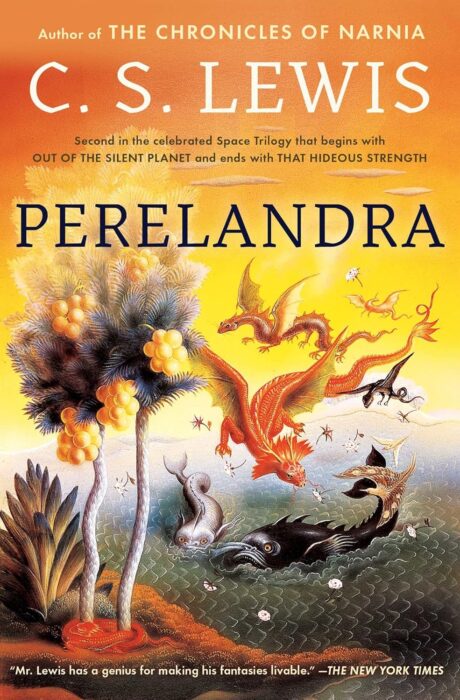270. How Did C. S. Lewis Fight for Living and Learning in Wartime?
Podcast: Play in new window | Download (Duration: 51:32 — 48.5MB) | Embed
Today it appears cooler heads have cancelled the apocalypse.1 But were we ever really in that level of danger? This sense of dread feels new. But as C. S. Lewis once wrote, we must practice timeless wisdom when we’re living in an atomic age: “If we are all going to be destroyed by an atomic bomb, let that bomb when it comes find us doing sensible and human things praying, working, teaching, reading, listening to music, bathing the children, playing tennis, chatting to our friends over a pint and a game of darts.” Here and elsewhere, how does Lewis encourage us in the art of living and learning in wartime?
Episode sponsors
- Enclave Publishing: The Crier Stone by Lyndsey Lewellen
- Realm Makers Expo 2025
- The Company: Kingdom Writers, World Changers
- Above the Circle of Earth by E. Stephen Burnett
Mission update
- Lorehaven reviews: The Crier Stone, upcoming A Study of Shattered Spells
- Subscribe free to get updates and join the ever-growing Lorehaven Guild
Prologue
- Readers have an ongoing love/hate relationship with fictional wars.
- We know war is terrible in reality, but without conflict, we have no story.
- We’ll explore three ways people react to war, with Lewis’s clear responses.
1. We could retreat to pacifism.
- As a teen, I met my first “pacifist,” an avuncular young fellow at a seminary.
- Nice chap. Well-meant. Said he can’t defend his family against burglars.
- Many listeners may feel similarly, and I do want to respect their thinking.
- But it’s hard to respect someone’s “ethics” if they’re not from Scripture.
- I feel the same way about war-obsessives (see chapter 2) as about this.
- Yet we come to hear Lewis, like his essay “Why I Am Not a Pacifist” (video):
To call [war] useless because it did not also cure slums and unemployment is like coming up to a man who has just succeeded in defending himself from a man-eating tiger and saying, “It’s no good, old chap. This hasn’t really cured your rheumatism!” On the test of fact, then, I find the Pacifist position weak. It seems to me that history is full of useful wars as well as of useless wars.
- Many have engaged Lewis’s points with select Scriptures and observations.
- One thoughtful critic said he felt Lewis must not have seen brave pacifists.
- Either way, it’s better to head to Scriptures like Leviticus and Romans 13.
- A close second: Lewis’s own fantasy in The Ransom Trilogy and Narnia.
- Prince Caspian and others reckon well with Martial imagery and wartime.
- Perelandra illustrates the limits of words and sends Ransom into real battle.
- Lewis well shows, more than tells, how just wars ought to look and feel.
- In his own war experience, and as an academic, he’s well-qualified here.
- Lewis also rebutted retreat in “The Dangers of National Repentance (PDF).”
- Here he takes a rather dim view of folks who “apologize” for their country.
- We don’t see this in his fiction, but we do see real folks with fake morals.
- I like better this Lewis essay, which isolates a particular sort of cowardice:
All Christians know that they must forgive their enemies. But “my enemy” primarily means the man whom I am really tempted to hate and traduce. If you listen to young Christian intellectuals talking, you will soon find out who their real enemy is. He seems to have two names—Colonel Blimp and “the business-man”. I suspect that the latter usually means the speaker’s father, but that is speculation. What is certain is that in asking such people to forgive the Germans and Russians and to open their eyes to the sins of England, you are asking them, not to mortify, but to indulge, their ruling passion. I do not mean that what you are asking them is not right and necessary in itself; we must forgive all our enemies or be damned. But it is emphatically not the exhortation which your audience needs. The communal sins which they should be told to repent are those of their own age and class—its contempt for the uneducated, its readiness to suspect evil, its self-righteous provocations of public obloquy, its breaches of the Fifth Commandment. Of these sins I have heard nothing among them. Till I do, I must think their candour towards the national enemy a rather inexpensive virtue. If a man cannot forgive the Colonel Blimp next door whom he has seen, how shall he forgive the Dictators whom he hath not seen?
- Thus, in our zeal for peace or empathy, let’s not forget biblical justice.
- We must not blame victims who fight back and excuse evil offenders.
- Such behavior is against real justice and marks the sin of cowardice.
 2. We might ruminate on violence.
2. We might ruminate on violence.
- One popular modern talking point claims that “men don’t read fiction.”
- And one popular intense rebuttal says, “Yes, men jolly well do read.”
- Both are half-true; in my view, many men tend to read particular fiction.
- Most popular men’s sci-fi or historical fiction offers an emphasis on war.
- LitRPG, games, action and spy thrillers, and military sci-fi have that edge.
- As a man, I enjoy some of these genres, but not exclusively these ones.
- Lewis often warned about people who get consumed with warlike imagery.
- His satirical demon Screwtape encourage this human retreat to “realism”:
Probably the scenes [your human patient] is now witnessing will not provide material for an intellectual attack on his faith—your previous failures have put that out of your power. But there is a sort of attack on the emotions which can still be tried. It turns on making him feel, when first he sees human remains plastered on a wall, that this is “what the world is really like” and that all his religion has been a fantasy.
You will notice that we have got them completely fogged about the meaning of the word “real.” They tell each other, of some great spiritual experience, “All that really happened was that you heard some music in a lighted building”; here “Real” means the bare physical facts, separated from the other elements in the experience they actually had. . . .
The general rule which we have now pretty well established among them is that in all experiences which can make them happier or better only the physical facts are “Real” while the spiritual elements are “subjective”; in all experiences which can discourage or corrupt them the spiritual elements are the main reality and to ignore them is to be an escapist.
Thus in birth the blood and pain are “real”, the rejoicing a mere subjective point of view; in death, the terror and ugliness reveal what death “really means”. The hatefulness of a hated person is “real” — in hatred you see men as they are, you are disillusioned; but the loveliness of a loved person is merely a subjective haze concealing a “real” core of sexual appetite or economic association. Wars and poverty are “really” horrible; peace and plenty are mere physical facts about which men happen to have certain sentiments. The creatures are always accusing one another of wanting “to eat the cake and have it”; but thanks to our labours they are more often in the predicament of paying for the cake and not eating it.
Your patient, properly handled, will have no difficulty in regarding his emotion at the sight of human entrails as a revelation of Reality and his emotion at the sight of happy children or fair weather as mere sentiment.
- So in Lewis’s thought, evil spirits want us to refine evil/suffering as “real.”
- Indeed, we often meet people who act as if joy and love are sentimental.
- It’s not. If it were, Christians would have no hope in our Prince of Peace.
- Alas, conflict can be necessary. In fact, without this we’d have no story!
- But our battles are at worst temporary. If we think otherwise, we are lying.
3. Or we may ‘monitor the situation’
- Even if we don’t view war as permanently “real,” we may ruminate on news.
- We may feel survivor bias, or deep empathy for war victims we don’t know.
- Some feel almost paralyzed by thoughts of the worst events happening.
- Lewis fought in World War I and lived in World War II, seeing both sides.
- Back in 1939 he wrote an essay called “Learning in Wartime” (PDF).
- Lewis explores three defense versus three wartime enemies of the scholar.
- He identifies excitement, frustration, and fear, ending with this wisdom:
War makes death real to us: and that would have been regarded as one of its blessings by most of the great Christians of the past. They thought it good for us to be always aware of our mortality. I am inclined to think they were right. All the animal life in us, all schemes of happiness that are centred in this world, were always doomed to final frustration. In ordinary times only a wise man can realize it. Now the stupidest of us knows.
- I do have a more optimistic, eternal perspective on our earthly work.
- God can end us whenever He wants, but our work does have eternal worth.
- Lewis wrote more poignantly about real death after World War II ended.
- This comes from his essay “On Living in an Atomic Age” (PDF), from 1948:
If we are all going to be destroyed by an atomic bomb, let that bomb when it comes find us doing sensible and human things—praying, working, teaching, reading, listening to music, bathing the children, playing tennis, chatting to our friends over a pint and a game of darts—not huddled together like frightened sheep and thinking about bombs. They may break our bodies (a microbe can do that) but they need not dominate our minds.
What the atomic bomb has really done is to remind us forcibly of the sort of world we are living in and which, during the prosperous period before, we were beginning to forget. And this reminder is, so far as it goes, a good thing. We have been waked from a pretty dream, and now we can begin to talk about realities.
- In fiction and nonfiction, Lewis shows the paradox of life on violent Earth.
- We can’t retreat to pacificism, ignoring biblical courage and present reality.
- We don’t ruminate on violence and act like only present death is “real.”
- And we don’t “monitor the situation” and forget God’s callings for us.
- We follow past wisdom, mind present reality, and anticipate the future.
- That’s a future like The Last Battle, when all fighting ends for eternal peace.
Com station
Top question for listeners
- How do you react first to conflict in reality or in fiction?
Next on Fantastical Truth
Christian missionaries have traveled oceans to strange new lands. They’ve smuggled Bibles into hostile territory. Someday they will even journey to space settlements. But what about today’s virtual mission fields in digital spaces, like gaming platforms and communities? Developer Brock Henderson with Christian Game Developers, whose conference teams up this month with Realm Makers, joins us to explore Kingdom service in these open worlds.
- Photo by Emanuel Kypreos on Unsplash. ↩
































Good discussion. I guess I’d agree with Lewis’s critics that he negatively stereotyped pacifists, but I’d agree with Lewis that pacifism isn’t tenable in this world.
I actually found the climax of Perelandra to be anticlimactic. It was like C. S. Lewis wrote himself into a corner where he couldn’t resolve the plot any other way.
I will say this in defense of the guy who said he wouldn’t fight a burglar to defend his wife and kids. It’s possible if he did, he still wouldn’t have been able to stop the man from hurting them. (Though I’d have still encouraged him to try.)
It’s weird that my comments have been closer to defending pacifism when I don’t actually agree with it. I guess it’s because this podcast episode was more anti-pacifism and I have an argumentative streak.
Anyway, I remember once reading an essay on The Last Battle by C. S. Lewis (from a nonChristian perspective.) The essayist couldn’t see how it could be considered Christian since he felt like Lewis was really relishing the descriptions of the hateable villains and encouraging the readers to hate them. He felt like the descriptions of paradise were dull by comparison. I’ve never felt this way about the book. I always got the impression Lewis put as much passion into the heavenly parts as the violent parts, maybe even more so as this episode describes.